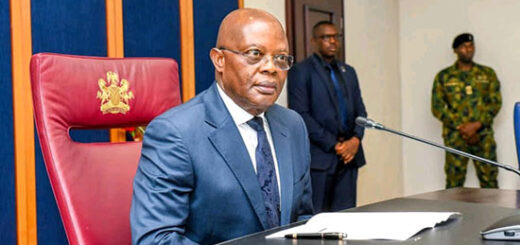Bagudu, Aliyu: why tax reform is transformative
 Minister of Budget and Economic Planning Atiku Bagudu has given a strident defence of the Tax Reform Bills before the National Assembly, saying if passed, they will give far-reaching transformation to the economy.
Minister of Budget and Economic Planning Atiku Bagudu has given a strident defence of the Tax Reform Bills before the National Assembly, saying if passed, they will give far-reaching transformation to the economy.
Also at the weekend, former Niger State Governor Babangida Aliyu, said the bills would help in the development of the country and asked those criticising the bills to study the provisions.
Chairman of the Presidential Fiscal Policy and Tax Reform Committee, Taiwo Oyedele, refuted insinuations that the bills will hand over tax collection to consultants.
There is no such provision in the bill, he stated.
Aliyu, who spoke during the graduation of members of the Executive Intelligence Management Course 17 at the National Institute for Security Studies in Abuja, said: “I was speaking to the NSA (Nuhu Ribadu) when we were in the common room, and I said to him, look, many of the people debating the tax bills have not read them.
“But again, there is the problem of communication; the government should speak more. When the majority of the people are not literate, you should be the first to speak on any major policy, particularly a policy that will bring changes, so that the people can understand.
“You cannot say because of one person, the policy cannot be taken. So, communication is very, very important.”
This, according to him, is the best way to douse the ongoing controversy.
Bagudu said Nigerians’ involvement in the tax reforms debate would lead to a better understanding of the bills and eliminate the negative views held by those who have not read the proposals.
He welcomed the opinions so far expressed about the bills, saying they signify a dynamic process of building consensus.
“These reforms are not a decree; they are open for discussion. You can engage with your representatives, lobby, explain, ask questions, and interrogate. I have seen people change their views after gaining deeper knowledge,” Bagudu said.
The minister cautioned against letting divisive sentiments like tribalism and religion overshadow the discussions on the tax bills and weaken the federation.
He said: “We must focus on reasoned debates. The President is determined that Nigeria takes its rightful place among nations.
“All measures, whether tough or otherwise, are taken with a vision for a united and prosperous Nigeria.
“We need reasonable, respectable, and nationalistic contributions to shape better legislation. There is no action or law under this administration designed to favour or target any part of the country unfairly.”
Bagudu lauded the President for his democratic approach to governance, describing him as a leader who values public input.
He urged Nigerians to analyse proposed tax changes, especially the review of VAT rate and to compare Nigeria’s tax structure with those of other countries.
“First, try to understand the proposals. Don’t just judge—seek knowledge and context,” he added.
The minister explained that one of the key goals of the tax reforms.was to simplify compliance, particularly for Small and Medium-size Enterprises (SMEs).
“We’ve been investing in MSMEs and nano credits to make them engines of growth. Complex and outdated tax legislation cannot co-exist with this vision,” Bagudu said.
He pointed out that some tax bills are excessively lengthy and filled with technical jargon, making compliance difficult.
“One of the bills generating the most controversy is 247- page long, repealing 12 existing laws, amending 19 others, and revoking some altogether. Small businesses cannot navigate such complexities without expert guidance,” he noted.
The minister shared an example of how Nigeria’s complex regulatory environment impacts international trade.
Read Also: Tax reform bills not meant to impoverish north — Akume
“A European Ambassador recently informed me that companies in his country invoice goods to Ghana or Cameroon at least 40 percent cheaper than to Nigeria due to our multiple regulatory challenges.”
He called for a holistic approach to reforms to ensure that tax policies support growth, reduce regulatory burdens, and foster employment generation.
Bagudu also highlighted the Tinubu administration’s ongoing infrastructure and security investments as evidence of its commitment to national development.
“The President has requested input from governors on projects that can boost economic activities in their states. Energy transition, increased security investments, and support for state initiatives are all part of this strategy,” he said.
Acknowledging the challenges of implementing tax reforms, Bagudu argued that such measures are essential for long-term growth.
He added: “Even in advanced countries, tax legislation is a contentious issue. For us, the focus should be on what these taxes aim to achieve – growth, productivity, and job creation. Every measure we take is intended to drive major economic activity and development.”
No provision for consultants in tax collection
Oyedele, in tweets on his X handle, said the bills have no provision permitting the engagement of consultants for tax assessment and collection duties.
Oyedele’s clarification came amidst public inquiries regarding the scope and implications of the proposed legislative reforms.
He said: “There is no provision in the tax bills seeking to introduce consultants for tax collection. In fact, Section 19(3) of the Nigeria Revenue Service (Establishment) Bill specifically prohibits the engagement of consultants for the assessment or collection of taxes on behalf of the tax authority.”
The Nigeria Revenue Service (Establishment) Bill, he said, empowers the Revenue Service to appoint and employ consultants, accountants and other professionals or agents when necessary to support its operations.
However, Oyedele stressed that their roles are strictly defined.
He said: “Such consultants shall not carry out the duties of assessment or collection of tax, tax compliance or enforcement activities, or routine responsibilities of tax officials.
“This ensures that tax administration remains a core function of the government, maintaining accountability and avoiding potential conflicts of interest.
Responding to questions about Section 69 of the Nigeria Tax Administration Bill, which allows tax authorities to use technology and third-party platforms for tax collection, Oyedele explained that this is not a new concept.
“The provision currently exists under Section 25 of the FIRS Establishment Act 2007, as amended by the Finance Act of 2021,” he noted.
The retained provision seeks to enable tax authorities to automate processes and facilitate tax compliance.
He said: “The necessary applications and payment solutions may be developed by the relevant tax authority or procured from third parties.
“This is a common practice globally for tax administration, and in principle, it is not different from the way a public or private sector organisation such as banks and online stores use third-party applications for payments.”
To address concerns about governance and transparency in the use of third-party applications, Oyedele pointed out the inclusion of comprehensive oversight mechanisms in the tax bills.
“The First Schedule to the Nigeria Revenue Service (Establishment) Bill sets out a governance framework for the activities of the tax authority, including measures to prevent conflicts of interest.
“Additionally, Section 26 requires the tax authority to submit periodic reports of its activities, including audited accounts, to the Minister of Finance.”
The minister, in turn, is mandated to present these reports to the Federal Executive Council and the National Assembly. These measures are designed to ensure that the adoption of technology in tax administration is carried out with accountability and efficiency.
Oyedele noted that these reforms align Nigeria’s tax administration practices with global standards. The deployment of technology for tax administration is expected to improve efficiency, reduce human intervention, and promote seamless interactions between taxpayers and tax authorities.
The proposed tax bills represent a significant step toward modernising Nigeria’s tax system. By clearly defining the roles of consultants and leveraging technology within a robust governance framework, the reforms aim to enhance transparency, efficiency, and compliance, aligning with international best practices.
As stakeholders continue to examine the bills, Oyedele’s remarks serve to dispel misconceptions and highlight the government’s commitment to accountability and technological advancement in tax administration.
Bills not targeted at impoverishing North, says Akume
The bills are not designed to marginalise the North, the Secretary to the Government of the Federation (SGF) George Akume said yesterday.
Senator Akume, who spoke during an interview on TVC programme Politics on Sunday, said the intent of the bills were to promote national growth and fiscal sustainability.
He described the bills as “pro-poor” and “nationalistic,” urging critics to evaluate their purpose rather than politicising them.
Akume said: “These bills are not targeted at any section of the country. I am from the north, and I am 100 per cent supportive of these bills.
They followed a normal legislative process, starting from the Federal Executive Council (FEC) to the Attorney-General of the Federation (AGF) and finally to the National Assembly.”
Highlighting the reforms’ benefits, Akume explained that individuals earning less than ₦800,000 annually and small businesses with revenues below ₦550 million would be exempt from paying taxes.
He further said sectors such as education and healthcare are exempted from value-added tax (VAT), adding “these provisions show that the bills are designed to support the poor and foster economic growth.”
Akume criticised the opposition for what he described as a misrepresentation of the bills’ intentions.
“Many of those arguing against these bills have not even read them. Some are attacking purely from the perspective of opposition politics, aiming to gain support by spreading misinformation,” he said.
The SGF also noted that the reforms ensure equitable revenue distribution, particularly benefiting northern states and local governments.
“Under the new arrangement, states will receive 55% of generated revenues, while local governments will get 35 per cent. With more local governments and states in the north, the region stands to gain significantly.”
Akume urged Nigerians to focus on the bills’ broader objectives of modernising the country’s tax system and enhancing fiscal stability, saying “for over 50 years, no attempt has been made to reform our tax system despite its archaic nature. These bills aim to ensure maximum value for the people and propel the economy toward prosperity.”
He acknowledged the growing resistance to the reforms, attributing it partly to a lack of effective communication, he however advised critics to channel their concerns through proper legislative processes, such as public hearings, instead of resorting to protests.
“Protests don’t advance the cause of peace or dampen the spirit of those supportive of these reforms,” he said.
Reiterating his belief in democracy’s problem-solving capacity, Akume expressed confidence that a consensus would eventually emerge to address any issues with the bills.
“Circumstances will build consensus. In a democracy, everyone has their say, but let’s give these bills a chance and see how they enhance our fiscal sustainability and economic growth,” he concluded.













